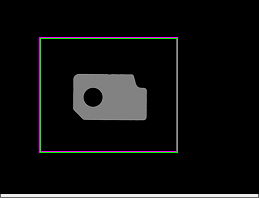I wrote a blog before. It's a way to draw a rectangle, but today's method is better than the previous one. It's convenient for me and my friends......
Direct code:
Write the following code in the header file
protected: HICON m_hIcon; CPoint m_ptbegin; CPoint m_ptEnd; BOOL m_blBtnDown; CDC m_dcMemory;
In the implementation file:
void CModifyRectDlg::OnLButtonDown(UINT nFlags, CPoint point)
{
// TODO: add message handler code and / or call defaults here
//GetCursorPos(&point);
CWnd *pWnd = GetDlgItem(IDC_STATIC);
CDC *pDC = pWnd->GetDC();
CRect rcClient1;
GetCursorPos(&point);
pWnd->ScreenToClient(&point);
pWnd->GetClientRect(&rcClient1);
if(point.x> rcClient1.left&&point.x <rcClient1.right&&point.y <rcClient1.bottom&&point.y> rcClient1.top)//Limit click location
{
//ClipCursor(&rcClient);
m_blBtnDown = TRUE;
m_ptbegin = point;
// pWnd->GetWindowRect(&rcClient);
//ScreenToClient(&point);
CBitmap oBitmap;
oBitmap.CreateCompatibleBitmap(pDC, rcClient1.Width(), rcClient1.Height());//Create an object that is the same as the original
if (m_dcMemory.m_hDC != NULL)
{
m_dcMemory.DeleteDC();
}
m_dcMemory.CreateCompatibleDC(pDC);//First, set up the data in this DC, and then complete the refresh of this window in the DC copied to the window
m_dcMemory.SelectObject(&oBitmap);
m_dcMemory.BitBlt(0, 0, rcClient1.Width(), rcClient1.Height(), pDC, 0, 0, SRCCOPY);//Transfer the device of one memory block to another
oBitmap.DeleteObject();
ReleaseDC(pDC);
}
CDialog::OnLButtonDown(nFlags, point);
}
This is a double dc method. CreateCompatibleBitmap, CreateCompatibleDC copies a dc rectangle for drawing, and BitBlt transfers the device of one memory block to another memory block for display
void CModifyRectDlg::OnMouseMove(UINT nFlags, CPoint point)
{
// TODO: add message handler code and / or call defaults here
if (m_blBtnDown==TRUE)
{
CWnd *pWnd = GetDlgItem(IDC_STATIC);
CDC *pDC = pWnd->GetDC();
CRect rcClient;
pWnd->GetClientRect(&rcClient);
GetCursorPos(&point);
pWnd->ScreenToClient(&point);
if(point.x> rcClient.left&&point.x <rcClient.right&&point.y <rcClient.bottom&&point.y> rcClient.top)
{
pDC->BitBlt(0, 0, rcClient.Width(), rcClient.Height(), &m_dcMemory, 0, 0, SRCCOPY);
pDC->SetROP2(R2_NOTXORPEN); //Transparent rectangle
CRect rc(m_ptbegin, point);
rc.NormalizeRect();
pDC->Rectangle(&rc);
//ScreenToClient(&rc);//
ReleaseDC(pDC);
}
}
CDialog::OnMouseMove(nFlags, point);
}
void CModifyRectDlg::OnLButtonUp(UINT nFlags, CPoint point)
{
// TODO: add message handler code and / or call defaults here
m_blBtnDown = FALSE;
CWnd *pWnd = GetDlgItem(IDC_STATIC);
CDC *pDC = pWnd->GetDC();
pDC->SetROP2(R2_NOTXORPEN);
CPen pen(PS_SOLID,2,RGB(0,255,0));//Draw a colored rectangle with a brush
CPen* pOldPen;
pOldPen=pDC->SelectObject (&pen);
CRect rcClient;
pWnd->GetClientRect(&rcClient);
GetCursorPos(&point);
pWnd->ScreenToClient(&point);
if(point.x> rcClient.left&&point.x <rcClient.right&&point.y <rcClient.bottom&&point.y> rcClient.top)
{
m_ptEnd = point;
CRect rc(m_ptbegin, m_ptEnd);
rc.NormalizeRect();
pDC->Rectangle(&rc);
m_dcMemory.DeleteDC();//Remove device context
}
//Invalidate();
CDialog::OnLButtonUp(nFlags, point);
}
Results: